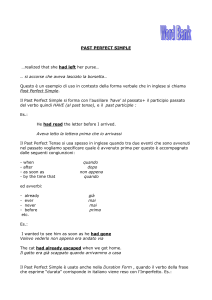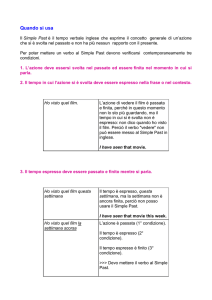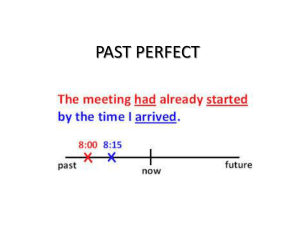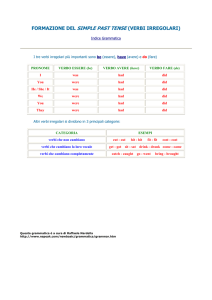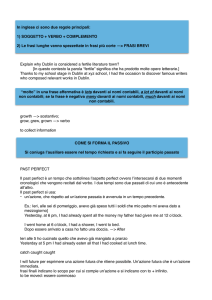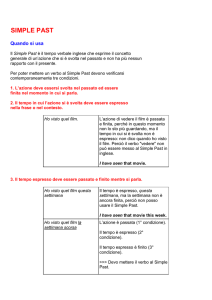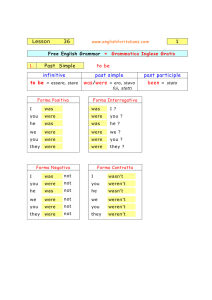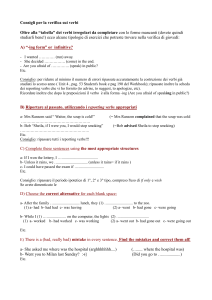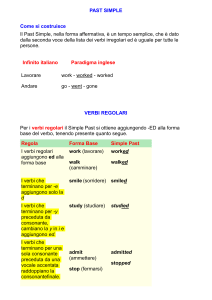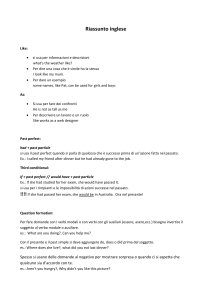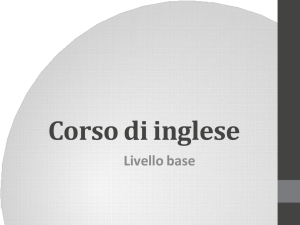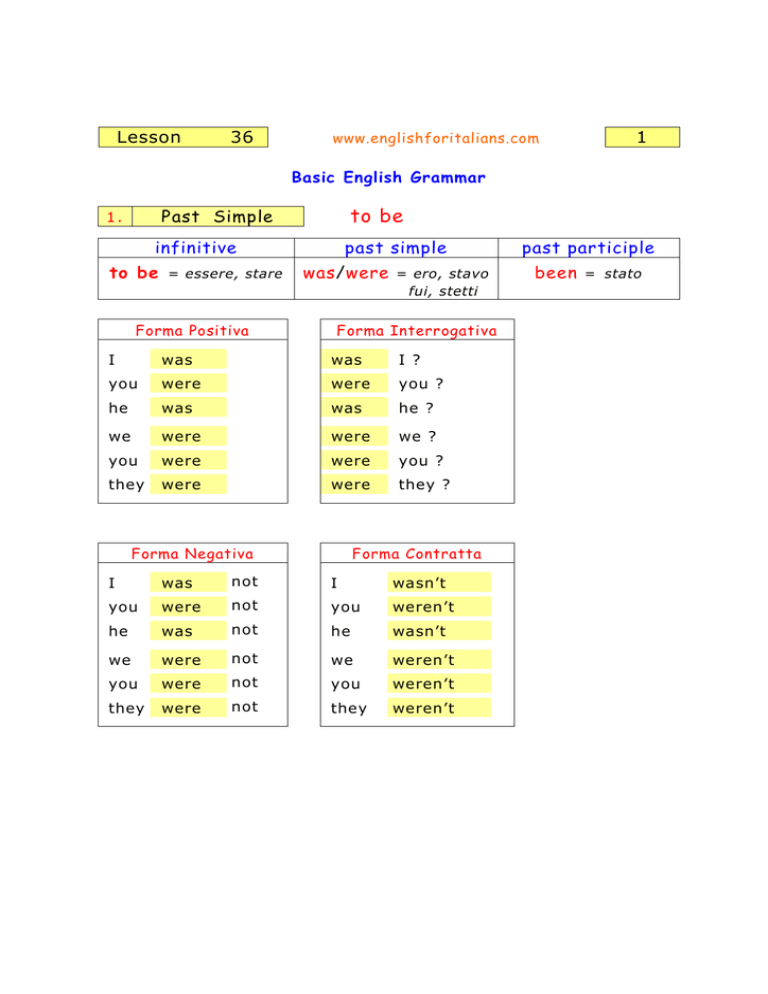
Lesson
36
www.englishforitalians.com
1
Basic English Grammar
to be
Past Simple
1.
infinitive
to be
= essere, stare
Forma Positiva
past simple
was/were
= ero, stavo
fui, stetti
Forma Interrogativa
I
was
was
I ?
you
were
were
you ?
he
was
was
he ?
we
were
were
we ?
you
were
were
you ?
they
were
were
they ?
Forma Negativa
Forma Contratta
I
was
not
I
wasn’t
you
were
not
you
weren’t
he
was
not
he
wasn’t
we
were
not
we
weren’t
you
were
not
you
weren’t
they
were
not
they
weren’t
past participle
been
= stato
Lesson
36
2
www.englishforitalians.com
Basic English Grammar
2.
to have
Past Simple
to have
had
= avere
infinitive
= avevo, ebbi
past simple
had
= avuto
past participle
“Had” si usa come ausiliare per formare il “past perfect”.
>
I had worked
(Io avevo lavorato)
You had worked
(Tu avevi lavorato)
He had worked etc.
(Egli aveva lavorato ecc.)
Forma Positiva
Forma Interrogativa
I
you
he
had
had
had
worked
worked
worked
had
had
had
I
you
he
worked?
worked?
worked?
we
you
they
had
had
had
worked
worked
worked
had
had
had
we
you
they
worked?
worked?
worked?
Forma Negativa
I
you
he
Forma Contratta
had not
had not
had not
worked
worked
worked
I
you
he
hadn’t
hadn’t
hadn’t
worked
worked
worked
we
had not
you had not
they had not
worked
worked
worked
we
you
they
hadn’t
hadn’t
hadn’t
worked
worked
worked
Lesson
36
3
www.englishforitalians.com
Basic English Grammar
Past Simple
3.
to have
usato come verbo principale
Forma Positiva
I
you
he
had got
had got
had got
we
you
they
had got
had got
had got
Forma Interrogativa
got
had
had
had
I
you
he
got?
got?
got?
had
had
had
we
you
they
got?
got?
got?
Forma Negativa
I
you
he
had not
had not
had not
got
got
got
we
had not
you had not
they had not
got
got
got
Forma Contratta
got
Forma Positiva
I
you
he
had
had
had
we
you
they
had
had
had
I
you
he
hadn’t
hadn’t
hadn’t
got
got
got
we
you
they
hadn’t
hadn’t
hadn’t
got
got
got
Forma Interrogativa
did - didn’t
did
did
did
I
you
he
have?
have?
have?
did
did
did
we
you
they
have?
have?
have?
Forma Negativa
I
you
he
did not
did not
did not
have
have
have
we
did not
you did not
they did not
have
have
have
Forma Contratta
did - didn’t
I
you
he
didn’t
didn’t
didn’t
have?
have?
have?
we
you
they
didn’t
didn’t
didn’t
have?
have?
have?
Lesson
36
4
www.englishforitalians.com
Basic English Grammar
4.
had
>
to have
Past Simple
usato come ausiliare per formare il “past perfect”
She had worked for the company for 5 years.
(Lei aveva lavorato per la ditta per 5 anni.)
>
When I arrived home my wife hadn’t prepared any dinner yet, so
we went to a restaurant.
(Quando arrivai a casa mia moglie non aveva ancora preparato la
cena, così siamo andati a un ristorante.)
>
Had you done that kind of work before?
(Avevi fatto quel genere di lavoro prima?)
>
If I had known I was going to live this long, I would have taken
better care of myself.
...se avessi saputo
Eubie Blake
I had got
-
Had I got?
-
1887 - 1983
I hadn’t got
Parlando di possesso, parentela, malattie...
>
Erika had got a beautiful house at the seaside.
>
Had Richard got a cold?
>
Monica didn’t have any brothers or sisters.
I had
-
Did I have?
-
I didn’t have
Nel linguaggio parlato, con il significato di possedere
>
Belinda had a large house at the seaside.
>
Did Belinda have a large house at the seaside?
>
Belinda didn’t have a large house at the seaside.
Lesson
36
5
www.englishforitalians.com
Basic English Grammar
Past Simple
5.
Regular Verbs
Il “past simple” dei verbi regolari si forma aggiungendo
“-ed” o “-d” alla forma base del verbo.
to work
to live
= lavorare
= abitare
I
worked
I
lived
you
worked
you
lived
he
worked
he
lived
we
worked
we
lived
you
worked
you
lived
they worked
they lived
Il “past simple” si usa per azioni che cominciarono e
terminarono nel passato. Traduce il passato remoto,
l’imperfetto e a volte il passato prossimo.
Passato Remoto
> Last week Barbara invited Abel to her birthday party. (invitò)
Imperfetto
> When Abel was a little boy he lived in Seville.
(abitava)
Passato Prossimo
> Yesterday I worked for ten hours.
(ho lavorato - lavorai)
Nota
Il “past simple” e il “past participle” dei verbi regolari sono uguali.
infinitive
to work
= lavorare
past simple
worked
= lavoravo, lavorai
past participle
worked
= lavorato
Lesson
36
6
www.englishforitalians.com
Basic English Grammar
Past Simple
6.
Regular Verbs
Forma Positiva
Forma Interrogativa
I
worked
did
I
work?
you
worked
did
you
work?
he
worked
did
he
work?
we
worked
did
we
work?
you
worked
did
you
work?
they
worked
did
they
work?
Forma Negativa
Forma Contratta
I
did not
work
I
didn’t
work
you
did not
work
you
didn’t
work
he
did not
work
he
didn’t
work
we
did not
work
we
didn’t
work
you
did not
work
you
didn’t
work
they did not
work
they
didn’t
work
Past Simple
Irregular Verbs
Non c’è una regola per formare il “past simple” e il “past
participle” dei verbi irregolari.
È quindi necessario conoscerli singolarmente.
Sul nostro sito: www.englishforitalians.com
trovi un elenco completo dei verbi irregolari più usati, con
trascrizione fonetica della pronuncia e la traduzione in italiano.
Lesson
36
7
www.englishforitalians.com
Basic English Grammar
Past Simple
7.
osserva
1.
Quando il verbo termina con
consonante si aggiunge -ed.
want
wanted
2.
Quando il verbo termina con -e si
aggiunge -d.
live
lived
Quando il verbo termina in -y
preceduta da consonante, questa si
cambia in “i” e poi si aggiunge -ed.
study
studied
3.
4.
Quando il verbo termina in -y
preceduta da vocale, si aggiunge -ed.
play
played
stop
stopped
5.
I verbi di una sillaba che terminano in
una vocale e una consonante, raddoppiano
la consonante ed aggiungono -ed.
6.
I verbi che terminano in ”l” preceduta
da una sola vocale, raddoppiano la “l”.
travel
travelled
Nota
Nell’inglese degli Stati Uniti il “past” di “to travel” è “traveled”.
present simple
past simple
I want
I wanted
I live
I lived
I study
I studied
I play
I played
I stop
I stopped
I travel
I travelled
Lesson
36
8
www.englishforitalians.com
Basic English Grammar
Pronuncia di -ed
1.
regola generale
La “e” del suffisso “-ed” - del “past” e del “past participle” non si pronuncia.
loved
lived
smiled
arrived etc
lúvd
livd
smaild
Eraivd
Eccezione
2.
Quando -ed si aggiunge ad un verbo che finisce in t o d,
la “e” si pronuncia “i”.
wanted
waited
hated
shouted
started
===
to found
to add
3.
watched
f
sniffed
laughed
k
looked
p
stopped
s
kissed
x
ended
offended
needed
founded
added
endid
Efendid
ni:did
faundid
Adid
= fondare
= aggiungere
Quando -ed si aggiunge ai verbi che finiscono in ch - f - k - p
- s - sh - x, o i loro suoni, la “-ed” si pronuncia “t”.
ch
sh
wØntid
weitid
heitid
shautid
sta:tid
washed
mixed
wØtSt
snift
la:ft
lukt
stØpt
kist
wØSt
mikst
===
to sniff = annusare; fiutare
to mix = mescolare
>>>
Lesson
36
Basic English Grammar
9
Il brano che segue contiene verbi che finiscono in ch - f - k p - s - sh - x, o i loro suoni.
While the little boy watched television, he sniffed
incessantly because he had a bad cold, but he looked happy.
In fact, he laughed all the time as he watched the cartoons.
When his mother came into the room, he stopped watching
TV, ran to his mother, hugged and kissed her.
The mother smiled happily, took him to the bathroom and
washed his hands and face. Then she went to the kitchen,
mixed some hot milk and some honey in a large bowl and gave
it to him. - After drinking the milk, the little boy,
miraculously, stopped sniffing.
8.
Past Simple
Mentre nell’italiano parlato il passato remoto è poco usato –
eccetto in alcune regione del sud e del centro – in inglese, il
“simple past“ è il tempo più usato per parlare di un’azione
passata.
Il “past simple” si usa per parlare di azioni o situazioni che
iniziarono e finirono nel passato.
>
In 2010 I spent a wonderful holiday in Paris.
Last week I saw an interesting film about Abraham Lincoln.
Yesterday I received an email from my parents.
Two years ago I spent a whole month in London.
When I was a child we lived in Colorado.
Tipiche espressioni di tempo usate con il “past simple”
>
yesterday, yesterday morning, yesterday evening...
last night, last week, last month, last year...
in 2010, at eight o’clock, on my birthday, at Christmas...
two minutes ago, a week ago, a month ago...
during the spring, the summer, the winter....
when I was a child, when I lived in France...
for an hour, for a week, for a month, for a year...

